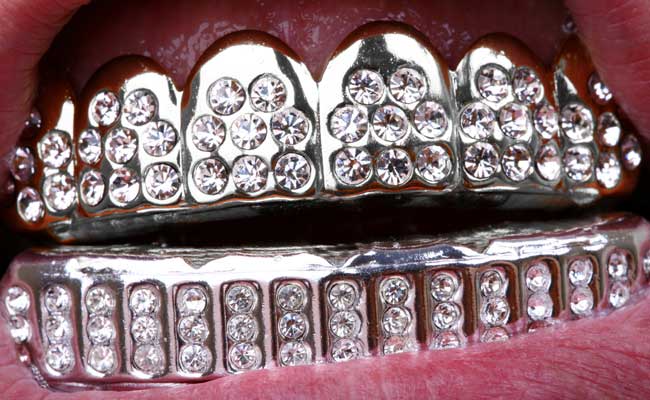Dental Consumer Products Overview: Denture Products
If you have dentures, or even if you haven’t, chances are you’ve seen TV advertisements for denture products. Because dentures and teeth loss can be emotional topics, it’s no surprise that the advertisements try (let’s call them) unconventional approaches. Sometimes they try too hard to be funny, sincere, or authoritative. Other times they go for realness and end up somewhere closer to too-much-information.
But for all their flaws, these ads are speaking to a sizable market. Over 60 million people in the US lack teeth, and according to the Journal of Prosthetic Dentistry, there will be 37.5 million people wearing full dentures by 2020. For people with dentures, consumer products on the market attempt to address two primary needs:
- Keeping dentures clean
- Keeping dentures in your mouth (preferably comfortably!)
Cleaning products come in a few varieties. Martha Raye, denture wearer, advocated for a brand of dissolving tablets that killed bacteria and remove stains. There are also pastes, much like toothpaste, that patients can use to brush their dentures—once the dentures are safely out of your mouth. Ultrasonic cleaning appliances can remove stains from dentures, although they are more expensive and also require the use of a special cleaning fluid. For patients concerned with chemical cleansers, homemade solutions using lemon juice, vinegar, or baking soda can all help remove stains and re-whiten dentures.
Denture adhesives include pastes or gels that come in a tube, like toothpaste and adhesive strips. These adhesives are meant to keep dentures in patients’ mouths comfortably while eating and talking.
Dentures are meant to fit comfortably in the mouth—and not require adhesives—because they are molded specially to the patient’s jawbone and palate. However, without teeth anchored in the jaw, the bone deteriorates over time, and its shape changes. This eventually leads to dentures that don’t fit, or that cause discomfort, requiring adhesive. Even cleaning dentures, which requires them to be removed from the mouth, could conceivably cause patients to experience negative feelings.
However, changes in dental technology can reduce these issues for patients. Fixed implant dentures use dental implants to secure replacement teeth permanently to the jaw. Patients can brush them in their mouth, just like teeth, and the implants themselves help the jawbone avoid further deterioration. Although implants do tend to be more expensive than traditional dentures, for many they are an appropriate, life-long solution to their dental needs.
Whether you’re looking for the best way to take care of your dentures or you’re considering whether implants might be a better solution for you, we’d love to talk to you. Call your Lancaster, CA dentist today at 661.952.7865 for an appointment to find out more!
More
Five Signs You Might Have Sleep Apnea… and One Thing You Can Do About It
At one point in time, maybe even only a few years ago, sleep apnea was not well-known among the public. Now, thankfully, public awareness of sleep apnea is much higher. After all, it is a dangerous condition, and because it is a disease that affects sleep, many people who have sleep apnea aren’t even aware of it.
If you suffer from sleep apnea, you will temporarily stop breathing during the night—up to hundreds of times! The health implications are quite serious, as sleep apnea is linked to many cardiovascular diseases, including high blood pressure, heart failure, stroke, and heart arrhythmias. So if you have sleep apnea, it’s important to get treatment.
So what are some signs or risk factors for sleep apnea?
- You’re overweight.
Body weight is linked to obstructive sleep apnea, which is caused by tissues in the upper throat collapsing, constricting the flow of air to the lungs. Heavier people can have tissue built up around their neck and throat; these tissues fall back and obstruct the airway when they’re lying down.
- You have high blood pressure.
When you stop breathing during an episode of sleep apnea, less oxygen gets to your brain. Since your brain needs to maintain sufficient oxygen levels at all times, this can lead to spikes in blood pressure as your body tries to compensate for low oxygen levels by pumping more blood, faster, to your brain.
- You’re often tired during the day.
Even if you think you’re getting plenty of sleep at night, you probably aren’t if you’re suffering from apnea. Not only do the interruptions detract from the amount of sleep you’re getting; they also detract from the quality of sleep. If you have difficulty waking up in the morning, feel tired all day long, need frequent naps, or doze off on occasion, you might have apnea.
- You’re frequently irritated, depressed, or prone to mood swings.
If you’re not getting enough sleep, it can quickly have an impact on your mood. Your body releases cortisol, a hormone that causes stress, if you’re sleep deprived. This means you might end up feeling anxious, irritable, or just out of sorts frequently.
- You snore.
If your spouse or significant other tells you that you snore, or if your snoring wakes you up, then that’s a good sign you might have sleep apnea. In fact, snoring is the most common sign of sleep apnea.
And now, for one thing you might not know about sleep apnea: there are treatment options other than a CPAP machine. In fact, if you have sleep apnea, you can call your dentist for help. There are simple oral appliances (mouth guards) that can position your jaw in such a way that it keeps your airway open during the night.
So if you’re concerned about sleep apnea, you might just want to talk to your Lancaster, CA dentist about it next time you’re in the office for a check-up. Call Douglas B. Weber, DDS at 661.952.7865 today, and we’ll be happy to help!
More
By admin
15 Aug, 2017
Cosmetic Dentistry, Dental Health, Dental Hygiene, Dental Tips, General Health, Lifestyle, Oral Health
caring for dental grills, dental grills, dental history, gold teeth, grillz

A Brief History of Grills
“I got my mouth looking something like a disco ball
I got the diamonds and the ice all hand set
I might cause a cold front if I take a deep breath
My teeth gleaming like I’m chewing on aluminum foil”
– Grillz, Nelly (featuring Pall Wall & Ali & Gipp)
Grills (or grillz) are, if not popular, at least fairly recognizable these days. Made of precious metals (gold and platinum being the most common) and often studded with diamonds, most grills are removable and worn over the front teeth. But where do they come from?
Although many people would point to Nelly and his 2005 song, “Grillz,” as the starting point for the trend, they’re actually much older than that. (And no, we’re not just talking about rappers like Slick Rick, Flavor Flav, and Big Daddy Kane from the 80s and 90s, either). We’re talking ancient history.
In ancient Italy, between 800 and 200 BC, wealthy Etruscan women wore teeth woven together with gold wire the thickness of a rubber band. The wire held together teeth that had been removed and were placed back into the mouth, so they made eating difficult. The practice wasn’t necessarily common, but archaeologists found documentation of around 20 sets of teeth woven together in this way. Etruscan civilization vanished as the Romans took over Italy, and this fashion trend died with it.
In Latin America, Mayans actually cut small holes into their teeth and filled them with precious stones, typically jade. Again, this was a trend that only royalty and the wealthy could afford. Although the Mayan civilization has disappeared, many people in southeastern Mexico, Belize, Honduras, and Guatemala still wear gold tooth jewelry today.
In ancient Filipino myths, the creator of the world, a deity named Melu, had gold teeth—and during what was the Middle Ages in Europe, Filipinos were filing down their teeth and decorating them with gold. Some of these decorations included gold bands that covered the entire front row of teeth; the oldest date to around 1300 AD.
As the Renaissance began in Europe, dentistry was becoming more scientific and less superstitious—and Giovanni de Arcoli, a 15th century Italian professor of medicine, became the first author known to recommend filling cavities with gold to preserve them.
Grills started appearing in rap and hip hop videos in the 80s, and became even more popular as Southern rap began to take off in the 90s and early 2000s. And now, they’ve jumped into mainstream culture, as celebrities like Madonna, Miley Cyrus, Katy Perry, and even Ryan Lochte have sported them in recent years.
You might expect a dentist to come out against grillz as a health hazard, but no studies have proven that they’re bad for your teeth. As long as they’re removed and the teeth are brushed and flossed as appropriate, they shouldn’t cause health problems. Some metals can cause irritation; if it causes a rash, or bleeding, or other problems, just stop. Similarly, don’t clean them with anything toxic to ingest (like most jewelry cleaners), and don’t try to attach them permanently to your teeth with glue. But if you want to wear a grill, and you use some common sense and take care of your teeth, you’ll be part of a long tradition of dental jewelry.
We can’t recommend a jeweler to create your grill, but if you have any questions about dental instruments—either ornamental or for health reasons—please give us a call at (661) 952-7865 and we’ll be happy to answer your questions.
More
“People grow through experience if they meet life honestly and courageously. This is how character is built.”
– Quotation attributed to Eleanor Roosevelt’s wisdom teeth
If your wisdom teeth can offer insight like that, why would you ever have them removed? Most likely, you or someone you know has had them removed. It turns out there’s a solid reason.
In fact, wisdom teeth, which earned their name because they emerge at the onset of adulthood, aren’t all that wise. (Most people believe Eleanor Roosevelt came up with that statement on her own, but it’s no coincidence that it occurred after her wisdom teeth came in!)
Scientists believe that wisdom teeth helped our ancestors with a diet that was much harder on their teeth than our diet is to ours. However, they only begin to come in when people are around the age of 17 to 21 years of age. Since they emerge so late, after your other teeth are well-established, wisdom teeth often create unnecessary problems in your mouth.
If you keep your wisdom teeth, you might be able to eat beef jerky 10% faster, but the complications that can arise make them not worth the risk. (And if you eat enough beef jerky to think you might want to keep your wisdom teeth after all, you probably should speak to a nutritionist.)
What Can Go Wrong?
The main issue is that wisdom teeth become impacted. This means that your wisdom teeth cannot fully emerge, because your gums, back molars, or a combination of both are blocking them. Impacted wisdom teeth can create swelling and pain in your mouth. Additionally, they can be a difficult to keep clean, making you more likely to get cavities and gum disease.
Why Not Wait Until You Know There Is an Issue?
There are three good reasons to remove wisdom teeth before they cause problems, aside from the fact that they’re not necessary to help us process tough foods anymore.
1. When your wisdom teeth first emerge, the roots aren’t as established, making them easier to remove.
2. Wisdom teeth roots can grow near nerves, creating complications should you need to remove them later.
3. Recovery time is typically longer if you wait to get your wisdom teeth removed, with possible additional symptoms including excessive bleeding, numbness, and reduced jaw movement.
What Should I Do?
There is some debate if one should get their wisdom teeth taken out as soon as they come in. People with impacted wisdom teeth or other related complications should follow the advice of their dentist and take the proper action.
However, for many people, wisdom teeth can emerge with few or no complications. If this is the case for you, dental hygiene will become even more important to avoid cavities and gum disease. You will also want to stay consistent with your x-rays and professional cleaning visits to ensure your wisdom teeth stay healthy and clean.
Even if your wisdom teeth initially come in healthy, there’s no guarantee they won’t cause complications in the future. They could cause problems later in your life, which is a reason to just go ahead and have them removed.
Whatever you choose, your dentist will be able to track your wisdom teeth as and after they emerge. If you have questions about your wisdom teeth, please call or make an appointment with us today!
More
Have you ever watched shows like Lost or movies like Cast Away and wonder how the teeth of these people must feel like after an extended stay on a remote island? Fortunately, there are a few things they (or you, if you go camping or get stranded) can do to help maintain a healthy smile when you don’t have access to a dentist or minty toothpaste.
When you don’t have a toothbrush and floss, the concept of oral hygiene remains the same. Keep food debris from sticking around inside your mouth, and agitate the bacteria so plaque and tartar don’t develop.
In a bind, you can use a clean cloth or part of your t-shirt. Put the cloth on your finger and rub your teeth and gums as you would with a toothbrush. This method is good for minor stays in the wilderness, but won’t provide optimal care in the long run.
Use What’s Around You
In the unfortunate situation you are without proper care for an indeterminate amount of time, you can find or adapt natural tools from your surroundings to clean your teeth.
Chewing stick. Find a tree that has fibrous branches. Break off a toothbrush sized twig. Chew on one end to fray that part of the twig, which can now be used in lieu of an actual toothbrush. As strange as this may sound, a lot of cultures around the world still use chewing sticks for their dental hygiene. Due to the chemical composition of some trees (apple, fig, bamboo, and many more), they can help protect your teeth when chewed on.
Small bones. If you are hunting for food, save some of the smaller bones. They can be used as toothpicks, removing food debris from between your teeth.
Hair. This may seem gross, but if you didn’t bat an eye at small bones, you may as well try this trick too. If you have hair is long enough, you can use it as a substitute for floss.
Water. Rinse with water (sterilized, if possible) to keep your mouth clean after brushing.
Avoid problem foods. Without access to proper dental care, it’s best to avoid foods that can damage your teeth. Try not to eat fruits with a high acidity level, or foods that easily get stuck in your teeth.
Now you know how Tom Hanks kept his smile going stuck on an island for three years. (And you thought it was Hollywood make up artists?) While these options may sound less than appealing, they could be the difference between having healthy or damaged teeth while out in the wilderness. That and no one likes the feeling of fuzzy teeth.
If you’ve just returned from the wild, or if you’d just like to stay up to date on your dental visits, please don’t hesitate to give us a call!
More





